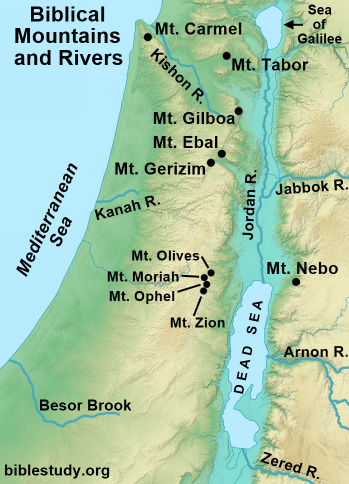Uses
Mountains can help defend a city (Psalm 125:2) or provide a place of safety and refuge in times of trouble (Genesis 14:10, Judges 6:2, Matthew 24:16). While, at times, they have been locations where the true God has been worshipped (Genesis 22:2, 5, Exodus 3:12), other times mountains have been places where false deities were honored (Deuteronomy 12:2, 2Chronicles 21:11).
Symbolism
Mountains can also take on symbolic meanings depending on the context. They can symbolize difficulties and obstacles (Matthew 17:20), a righteous king who rules (Psalm 72:1 - 3) or nations of the world (Revelation 17:9). They can be symbolic of God's kingdom ruling over the entire earth (Daniel 2:35, Isaiah 2:2), which will commence at Jesus' Second Coming.
Famous Mountains
Mount Carmel is the place of the climactic battle between Elijah, representing the true God of Israel, and the false prophets of Baal and Asherah (1Kings 18). Mt. Ebal and Mt. Gerizim were the two mountains, commanded by God, that were used by the Israelites to shout out the consequences of both obeying and disobeying the Eternal's laws (Deuteronomy 11:29, 27:12 - 26, etc.).

Mount Tabor is where the Israelite forces of Deborah and Barak defeated Sisera, who was the military commander of King Jabin's army (Judges 4 - 5). Mount Zion (Sion) was part of the original city of Jebus (renamed Jerusalem) conquered and ruled by King David. He not only built his royal palace on the hill he is also buried in it (1Kings 2:10, Acts 2:29).
The Mountains of Ephraim are the location where Joshua, Eleazar (Israel's second High Priest) and Tola (a Judge) are buried (Joshua 24:30, 33, Judges 10:1 - 2).
In New Testament times, Mt. Gerizim was considered holy by the Samaritans and a place they used for worship (John 4:20). Mount Gilboa is the place where Israel's first king, Saul, and his son Jonathan, were killed while battling the Philistines (1Samuel 31:1 - 6).
Edom's Mount Hor is the place where Israel's first High Priest, Aaron, was divested of his priestly garments, died, and was buried (Numbers 20:23 - 29). Mt. Moriah is the place where God, in testing Abraham's faith, commanded that he sacrifice his only son Isaac (Genesis 22:1 - 18). It is also where the angel of the Lord, who was about to destroy Jerusalem, was stopped due to God's mercy (1Chronicles 21).
Although Moses was not allowed to enter the land promised to Israel, the Eternal allowed him to view it from the top of Mt. Nebo (Deuteronomy 32:49). Scripture seems to indicate that the mountains Nebo and Pisgah may be synonymous references (Deuteronomy 34:1).
Prophetic Mount
Old Testament prophecy states that the Lord, when he returns to earth the second time, will land on Olivet and split it in two. It is considered one of the seven mountains (hills) of Jerusalem.
And His feet shall stand in that day upon the Mount of Olives, which is before Jerusalem on the east, and the Mount of Olives shall split in two, from the east and to the west, and make a very great valley. And half of the mountain shall move toward the north, and half of it toward the south (Zechariah 14:4, HBFV).
Map Note
Please note that the map on this page does not list all mountains delineated in the Bible. The mounts not included in the map include Ararat (Genesis 8:4), Bethel (Joshua 16:1), Esau (Obadiah 1:19), Gilead (Genesis 31:21), Hermon (Deuteronomy 3:8), Lebanon (Judges 3:3), Paran (Deuteronomy 33:2), Seir (Genesis 14:6), Sinai (Exodus 3 - 4, 20) and others.